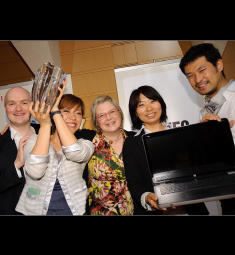Bigger, better, more vital than before
The coveted Masters in Business Administration (MBA) is not a new qualification, but in recent years it has benefited greatly from being reinvented, enhanced and improved upon to make it arguably more relevant and important than ever for getting ahead in business.
The major drivers of the changes have been internationalisation and globalisation, with the top business schools making sure they incorporate strong elements of trans-border business education in their programmes.
And given that the people who are opting to take MBAs have already spent several years in the workplace, the result of a course that hones the skills they have developed is people who have the experience, knowledge and confidence to be leaders in the world’s major corporations.

Christina Ahmadjian, dean of Hitotsubashi University Graduate School of International Corporate Strategy, says global leadership skills are critical for firms’ futures.
“There has been an increase in demand because there are so many opportunities here, as firms change the way in which they hire”, said Dean Christina Ahmadjian.
Many of the students are from China, South Korea and Taiwan, while most of the Western students who join the programme either have a strong interest in Japan, or a desire to study business from a fresh, non-Western perspective.
“There’s the idea that an MBA is a very US thing, but we’re trying to chip away at that image”, she said. “We see Japanese firms that send their students here, not because they want to have a piece of paper that says MBA, but because they want them to learn the global leadership skills that are critical for their firms’ futures.
“Japanese firms are globalising, they are thinking more strategically, they are developing more overseas operations, and they need these skills”.
Hitotsubashi ICS offers its students the choice of two programmes: one over 12 months, the other lasting two years and often incorporating time at top business schools in other parts of the world, such as at the London Business School, Kellogg School of Management or Peking University.
“Our faculty combines academics with practitioners of business”, said Ahmadjian. “We have former consultants, former investment bankers and people with industry experience, as well as leading scholars of business, with PhDs and teaching experience from some of the top business schools in the world.
“There are a lot of places that have one or the other, but few with that balance”, she added.
“The MBA is different from other masters-level qualifications”, said Nigel Banister, chief global officer for the Manchester Business School. “The others are more specialised and technical, with most people going on to them directly from their first degree, so that they continue their education before going to work. But that means they have no work-place experience.

The International University of Japan, in Niigata Prefecture, was created 29 years ago to create global leaders.
The university requires at least three years of management experience, with most of its full-time students in their late 20s and armed with team leadership experience.
The Manchester Business School’s MBA is among the oldest in Britain and a popular hunting ground for financial institutions looking to recruit their future leaders, although that has broadened out into a far wider range of industries aiming to secure the top business talent, Banister said.
The full-time course takes 18 months and the institution has seen an increase in demand from overseas students. This development has led to the opening up of “centres of excellence”—in Brazil, the US, the United Arab Emirates, Singapore, Hong Kong and, most recently, Shanghai—to meet the needs of business leaders of the future around the world.
“Because a large part of our focus is on international matters, we take the global view very seriously and anticipate that, very soon, 50% of everything that we do will be outside the UK”, said Banister, adding that the Manchester-based faculty spend part of their year in each of the centres to conduct courses that are condensed into intensive, long-weekend “block teaching” sessions on specific elements of the course that are supported before and after the classroom hours.
“We have a very multicultural mix, with people from all over the world and from different sectors, which makes working later in a multicultural environment second-nature to them”, he added.
There is a similar commitment to producing future leaders who are comfortable working in a business world with fewer international boundaries at the International University of Japan (IUJ), in Niigata Prefecture.
“Most of our students want to be leaders in major global organisations, especially in the Asian market”, said President Masakatsu Mori. “Graduates of the IUJ want to go into the international division of international organisations or firms but, within that, they want to operate in the Asian section”.
The university was created 29 years ago by the Japanese business community and organisations that recognised the increasingly acute need for global leaders in Japan. The MBA programme was set up 15 years ago and, for the past decade, has been rated in the top 100 in the world.

Manchester Business School boasts a multicultural mix
“Japanese firms have lots of money at the moment and use a great deal of technology, but they are short of the sort of people who can use that money and technology to do well in business”, Mori said. “And that is a huge problem for Japanese firms with operations outside this country.
“While corporations from China, South Korea, Indonesia and so on are being very aggressive in business, Japan lacks the global leaders to compete”, he added.
One of the key advantages of the IUJ course is the effort that has been put into developing partnerships with Japanese firms, with Mori meeting the heads of the vast majority of major corporations here to sign memoranda of understanding on the shared development of future leaders through work placement schemes, joint research and internships. At present, the university has agreements in place with 37 major Japanese firms, including Sumitomo Mitsui Banking Corporation, Panasonic Corporation and Takeda Pharmaceutical Company Limited.
Canada’s McGill University is another institution that offers an MBA tailored to the Japanese market and aimed at men and women who are relying on themselves to improve their careers and entrepreneurial prospects, said Philip O’Neill, director of the McGill MBA Japan Program.
“The McGill MBA Japan student is an average 34 years of age, so they are more experienced than students in most other tertiary institutions here”, O’Neill said. “We also offer all of our courses in English, so we require a very strong level of English language skill from our students.
“Our courses are taught by professors who fly in from our home campus in Montreal, so this is very different from other programmes in Japan”, he added. “At the moment, we are the only programme in Tokyo that is part of the Financial Times Global MBA Rankings, and at the moment we are in 57th place in the world”.
About half of the students at the Japan campus are Japanese nationals, with the rest currently drawn from 19 countries and many sharing the ambition of starting their own firms or simply developing a more fulfilling career.
“An MBA holder should be able to take on greater responsibilities”, O’Neill said. “Also, they should be in a position to help with the strategic direction of their organisation.
“In a downturn, an MBA holder should be much more resilient in the job market”, he added. “Along with this, an MBA holder will have a much wider set of options in their work and career, and they should also be in a position to start their own enterprise, if necessary”.
A radically different approach is being pioneered at the Kenichi Ohmae Graduate School of Business, which operates through distance learning.
“Demand for the course is continually rising, along with the increasing need for the globalisation of Japanese human resources. Our unique, customized curriculum is tailored to meet the needs of this market”, said Lisa Chung, the programme manager. “Our students graduate with a distinct improvement in both their global mindset and English skills, the two main attributes that are lacking for global competitiveness in the Japanese work force.
“Also, there is no opportunity cost for students as the time they can save by studying in this style permits them to remain fully employed while earning an MBA”, she added.
The large majority of students are Japanese, with a significant proportion based overseas—such as the Middle East, North America and China—while those in Japan have spent time working abroad, would like to in the future, or have regular interaction with non-Japanese in their business.
They get up to five years to complete the MBA, which is the first entirely on-line institution in Japan to be approved by the Ministry of Education, Culture, Sports, Science & Technology. Most students, however, strive to graduate within two years.
Students don’t get DVDs and books, like in traditional distance-learning programmes, which has been shown to dent isolated students’ motivation.
The Kenichi Ohmae Graduate School of Business MBA is very interactive and the institution has a studio to record live and online-accessible lectures, filming about 600 hours per year of lectures taught by selected CEOS, consultants and other leading executives—as opposed to academic professors—to provide the element of real-time, practical knowledge.
The students have access to an in-house developed “Air Campus” system, enabling 24-hour communication and constant global networking amongst students.
An MBA course requires a commitment of time and money, of course, but graduates invariably consider both to have been sound investments in their future careers.
The “Mini-MBA”
Known as a “mini-MBA”, the annual Japan Market Expansion Competition (JMEC) business plan challenge, for aspiring entrepreneurs and executives, attracted 51 participants from 20 countries this year.

JMEC 2011 winning team: Marc Nyhan, Asami Okusawa, Mary Fidler, Kyoko Mikami and Soichi Koshikawa. Photo: Antony Tran
Under the mentorship of senior Tokyo-based businesspeople, participants prepare individual business plans for organisations at a fraction of the market rate over seven months.
Since 1993, JMEC has produced 159 business plans written by 848 participants from 45 countries to help organisations:
• Enter the Japanese market
• Introduce new products/services
• Revitalise company operations
• Improve distribution networks
• Access new market segments
BCCJ President Philip T. Gibb, a JMEC judge, said: “The standard of the business plans and quality of the information and research this year was extremely high. The closeness of the final scores is testament to the effort put in by all participants”.
www.jmec.gr.jp
Tel: 03-5562-1444
E-mail: info@jmec.gr.jp


